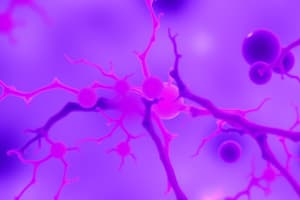Podcast
Questions and Answers
What is the outcome of cell degeneration?
What is the outcome of cell degeneration?
- Enhanced cell differentiation
- Accelerated cell regeneration
- Improvement of tissue function
- Deterioration of tissues, organs, or parts of the body (correct)
What type of stem cells are derived from the inner cell mass of a blastocyst?
What type of stem cells are derived from the inner cell mass of a blastocyst?
- Induced pluripotent stem cells
- Adult stem cells
- Mesenchymal stem cells
- Embryonic stem cells (correct)
What is the primary function of stem cells in the body?
What is the primary function of stem cells in the body?
- To modulate the immune response
- To regulate cellular metabolism
- To provide structural support to tissues
- To serve as a repair system of the body (correct)
What is the term for the gradual structural and functional changes in cells that occur over time?
What is the term for the gradual structural and functional changes in cells that occur over time?
What is the result of cellular substances being damaged?
What is the result of cellular substances being damaged?
What determines the health and life span of the body?
What determines the health and life span of the body?
What is the primary function of compensatory hyperplasia?
What is the primary function of compensatory hyperplasia?
Where is compensatory hyperplasia commonly seen?
Where is compensatory hyperplasia commonly seen?
What is the difference between physiological metaplasia and pathological metaplasia?
What is the difference between physiological metaplasia and pathological metaplasia?
What is an example of physiological metaplasia?
What is an example of physiological metaplasia?
What is the result of cell degeneration?
What is the result of cell degeneration?
What is the outcome of prolonged exposure to harmful stimuli, such as chronic smoking, in terms of cell transformation?
What is the outcome of prolonged exposure to harmful stimuli, such as chronic smoking, in terms of cell transformation?
What is the primary function of WUDQVIRUPLQJ JURZWK IDFWRUV (W*)?
What is the primary function of WUDQVIRUPLQJ JURZWK IDFWRUV (W*)?
What is the purpose of apoptosis in the human body?
What is the purpose of apoptosis in the human body?
What is the role of W* in skeletal muscle growth?
What is the role of W* in skeletal muscle growth?
What is the result of W*-ȕ when the liver attains maximum size in adults?
What is the result of W*-ȕ when the liver attains maximum size in adults?
What is the significance of apoptosis during the development of central nervous system?
What is the significance of apoptosis during the development of central nervous system?
What is the role of W* in cell growth and differentiation?
What is the role of W* in cell growth and differentiation?
Flashcards are hidden until you start studying



